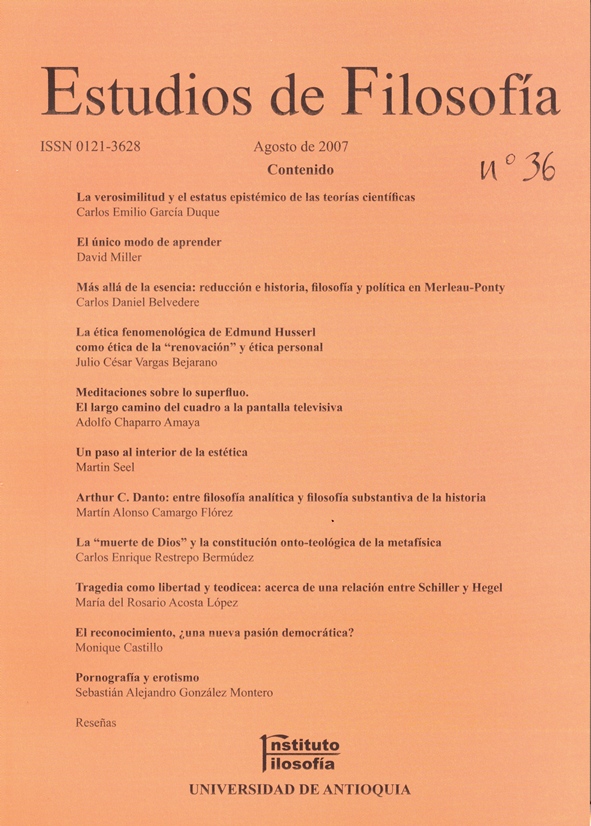Verosimilitude and the epistemic status of scientific theories
DOI:
https://doi.org/10.17533/udea.ef.12735Keywords:
Popper, verisimilitude, epistemic status, scientfic theories, scientific knowledgeAbstract
In this paper, I examine the problem of the epistemic status of scientific theories from the point of view of Poppers epistemology. Starting with the controversial statement “no scientific theory is true”, (A) which is a good candidate to express in a synthetic way certain fundamental implications of Poppers theory of verisimilitude, I analyze some criticisms against the fallibbilist view of science and suggest ways of adequately developing the meaning of (A), together with the meaning of other statements from the same family. I shall argue that only by means of these statements can we develop a good understanding of the scientific enterprise, and that they do not represent the collapse of epistemology. In addition, I shall show how to give a construal of these statements in such a way that they remain immune to the commonest criticisms. Furthermore, I shall examine the sense of the locution “scientific knowledge” with the purpose of showing that it is not advisable to interpret it according to the traditional sense of the word “knowledge”. I shall conclude that if we give a nuanced construal of (A) and its relatives, we will be in a better position to obtain a functional representation of the business of science.
Downloads
References
GARCÍA, C. Popper’s Theory of Science: An Apologia. Continuum Books, London, 2006.
LEWIS, D. Languages and language, en: Martinich, A. P. (ed.). The Philosophy of Language. Oxford University Press, New York, 1985.
POPPER, K. The Logic of Scientific Discovery. Hutchinson, London, 1959. DOI: https://doi.org/10.1063/1.3060577
____________. Conjectures and Refutations: The Growth of Scientific Knowledge. Routledge & K., London, 1963.
____________. Objective Knowledge: An Evolutionary Approach. Clarendon Press, Oxford, 1972.
____________. Realism and the Aim of Science. Hutchinson, London, 1983.
____________. In search of a Better World: Lectures and Essays from Thirty Years. Routledge, New York, 1992.
Downloads
Published
How to Cite
Issue
Section
Categories
License
Copyright (c) 2007 Carlos Emilio García Duque

This work is licensed under a Creative Commons Attribution-NonCommercial-ShareAlike 4.0 International License.
Authors who publish with this journal agree to the following terms:
1. The Author retains copyright in the Work, where the term "Work" shall include all digital objects that may result in subsequent electronic publication or distribution.
2. Upon acceptance of the Work, the author shall grant to the Publisher the right of first publication of the Work.
3. The Author shall grant to the Publisher a nonexclusive perpetual right and license to publish, archive, and make accessible the Work in whole or in part in all forms of media now or hereafter known under a Creative Commons Attribution-NoCommercia-ShareAlike (CC BY-NC-SA 4.0), or its equivalent, which, for the avoidance of doubt, allows others to copy, distribute, and transmit the Work under the following conditions: (a) Attribution: Other users must attribute the Work in the manner specified by the author as indicated on the journal Web site;(b) Noncommercial: Other users (including Publisher) may not use this Work for commercial purposes;
4. The Author is able to enter into separate, additional contractual arrangements for the nonexclusive distribution of the journal's published version of the Work (e.g., post it to an institutional repository or publish it in a book), as long as there is provided in the document an acknowledgement of its initial publication in this journal;
5. Authors are permitted, and Estudios de Filosofía promotes, to post online the preprint manuscript of the Work in institutional repositories or on their Websites prior to and during the submission process, as it can lead to productive exchanges, as well as earlier and greater citation of published work (see The Effect of Open Access). Any such posting made before acceptance and publication of the Work is expected be updated upon publication to include a reference to the Estudios de Filosofía's assigned URL to the Article and its final published version in Estudios de Filosofía.















